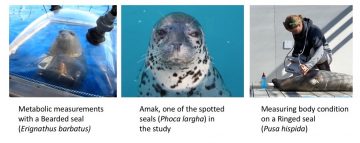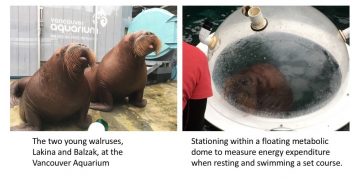Climate change and Arctic mammals
How is global climate change impacting Arctic marine mammals?
Changes in the extent of sea ice and prey distributions due to climate changes can significantly impact marine mammals.
- The Physiology and Health of Cooperating Arctic Seals (PHOCAS) This project studies the physiology and energetics of managed ice-dependent seals (spotted, ringed, bearded) to predict effects of climate change. This NOAA-funded project is a joint effort between Long Marine Lab (UCSC), the Alaska SeaLife Center, and the UBC MMean Lab.

- Bioenergetics of walrus. In order to estimate the impact of ice loss in the Arctic, we measured resting and swimming metabolism in 2 young walrus, and looked at the interactions with food intake and growth.

Recent studies:
Rosen DAS, Thometz NM, Reichmuth C (2021) Seasonal and developmental patterns of energy intake and growth in Alaskan ice seals. Aquatic Mammals 47(6): 559-573 (doi: 10.1578/AM.47.6.2021.559).
Thometz, NM, Hermann-Sorensen H, Russell B, Rosen DAS, Reichmuth C (2021) Molting strategies of Arctic seals drive annual patterns in metabolism. Conservation Physiology 9(1):coaa112. (doi: 10.1093/conphys/coaa112)
Rosen DAS (2020) Resting and swimming metabolic rates in juvenile walruses (Odobenus rosmarus). Marine Mammal Science 37:162-172. (doi: 10.1111/mms.12743)